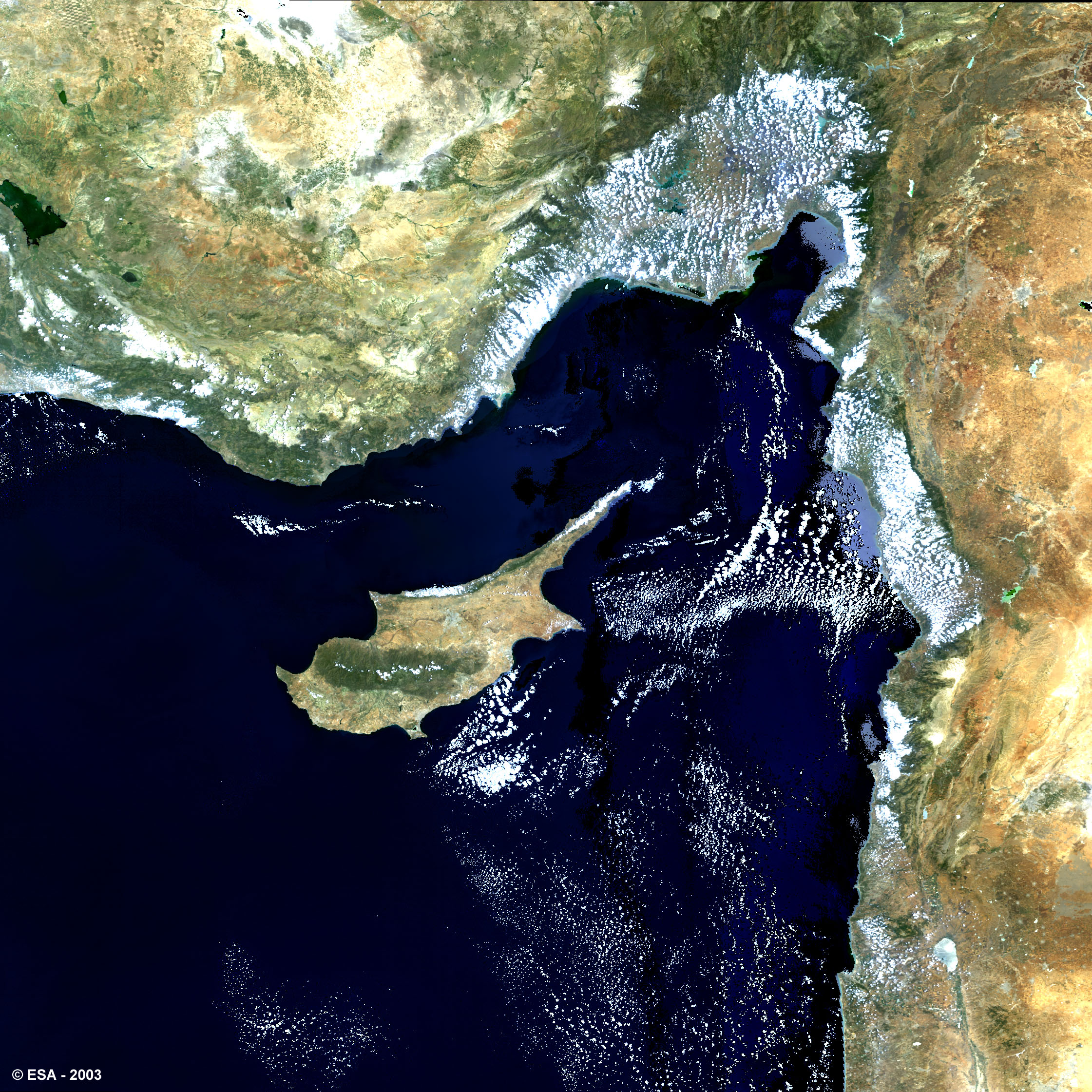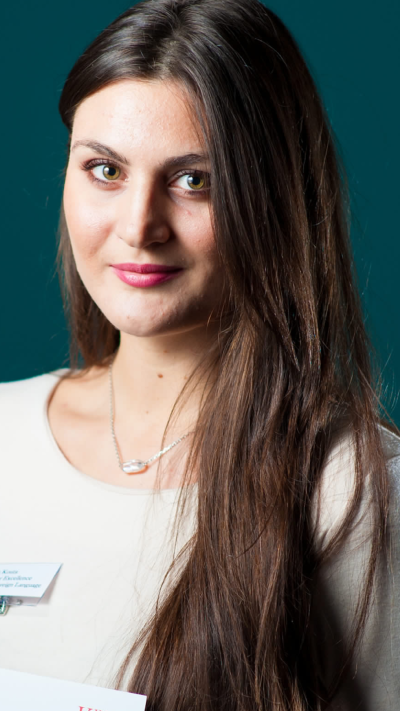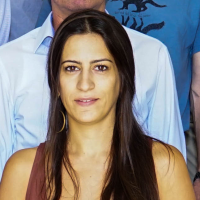Satellite remote sensing allows for the provision of up-to-date precision data, for timely response to social and environmental challenges.
Dr Georgia Kouta
Cyprus University of Technology
I. Addressing social and environmental challenges through Earth observation
Sharing Data. The global cooperation in the field of the collection of Earth observation satellite data is the best solution in order to address the global social and environmental challenges of the modern era, as demonstrated by an investigation carried out by the European Union.
Earth observation provides updated information for informed decision-making, since the data collected by land, sea, air and space remote sensing systems contribute to the observation and modeling of changes in the atmosphere of the Earth, the oceans and landscapes which are rapidly shifting mainly because of the human factor. This vital information, provided by Earth observation research centres, are critical sources for governments, the private sector and citizens, as they can be used to address social and environmental challenges, including natural disaster protection, tackling climate change, management of energy resources and promoting sustainable agriculture, inter alia.
Better Coordination. As a member and driving force of the intergovernmental organization for Global Earth Observation (GEO), the EU is working towards Open Data approaches to help in shaping policies in the fields of the environment, research, climate and sustainable development. This Global Earth Observation System of Systems (GEOSS) draws on the prerequisite that data sharing and provide a future wherein decisions and actions benefit humankind. However, the current process of collecting, storing, analyzing and distributing data remains fragmented, incomplete or reduntand as the Group claims. Hence, the outcome is a cacophony of information that can hardly contribute to new insights.
In fact, many scientists and experts like Markku Kulmala, Director of the Institute for Atmospheric and Earth System Research at the University of Helsinki, Finland and Head of the Aerosol and Haze Laboratory at the Beijing University of Chemical Technology, China, underlines the need for a global network of Earth observatories. In a recent article in Nature, Kulmala highlighted the insufficient coverage from Ground based stations and suggested that peripheral initiatives of well-equipped ground stations around the world in areas like Africa, Eurasia and South America, are considered crucial in the understanding and tackling of the challenges that Earth faces daily. Data from these stations, he continues, should be linked with data from remote sensing, laboratory experiments and computer models contributing to a network of ample and continuous information.
The need for a global network of Earth Observatories has been recognized also by the European Strategy Forum on Research Infrastructures (ESFRI), identifying the research infrastructures of European significance which correspond to the long-term needs of European research communities. One of these is the ACTRIS network, the strategic objective of which is to ensure long-term coordinated observations of aerosols, clouds and short-lived gas-phase species and the provision of services both at national and European level.
I.Cyprus and Space-Technology
In Cyprus, the research fields of Earth observation and space technology have now matured and the capitalization of existing knowledge and technologies is expected to allow progress in many different areas of application mentioned in the Smart Specialization Strategy, such as health, tourism, agriculture, cultural heritage, transportations, sustainable development, etc. In particular, through the EU Horizon 2020 funding programme, the creation of such a Centre of Excellence for Earth observation, which will participate in the GEO Global Earth Observation System, is closer than ever, since the EXCELSIOR Programme (ERATOSTHENES:Excellence Research Centre for Earth Surveillance and Space-Based Monitoring of the Environment) has successfully passed the first assessment phase with a 15/15 rating
Recent EU announcement on the assessment of the HORIZON 2020 programme presented on January 11, 2018, calls Europe to increase its investment in research and innovation in order to maximize its impact. Among others, the Commissioner for Research, Science and Innovation, Carlos Moedas stated that the evaluation demonstrated that the Horizon 2020 programme offers enough value to taxpayers and a real impact on their economy and quality of life.
The EXCELSIOR project envisions the creation of a Centre of Excellence to conduct a high level of basic and applied research in areas related to Earth observation and space technologies. Drawing on the existing infrastructure in research and innovation that has been developed over the last 11 years in the field of Earth observation and space, in the ERATOSTHENES Research Centre within the Faculty of Engineering and Technology of the Cyprus University of Technology, the ERATOSTHENES CoE aims to contribute to the advancement of knowledge in the fields of combined use of new space and geo-informatics technologies, as well as the implementation of these methodologies for monitoring of the natural and built environment. The ERATOSTHENES CoE is expected to become a research and innovation hub as well as an investment attraction, since according to the National Charter of European Research Area it will contribute to the increased participation of the private sector in research and innovation activities and promote the creation of spin-off companies. The Centre of Excellence will be based in Limassol with supportive infrastructure in the coastal municipalities of Cyprus, while its implementation will benefit the wider region of the Eastern Mediterranean, Middle East and Africa.
In our country, the responsible Governmental Department, for the preparation of a relevant strategy and the promotion of the use of space technologies for economic growth, job creation, wider social welfare, environmental protection and the safety of citizens and products, is the Department of Electronic Communications of the Ministry of Transport, Communications and Works. By decision of the Council of Ministers in October 2008, the coordinating role in issues of European Space Policy has been assigned to the Department of Electronic Communications. Programmes such as GALILEO / EGNOS, the Copernicus programme, as well as the relations of the Republic with the European Space Agency (ESA) have been included therein.
In July 2016, Cyprus signed the European Co-operating States (ECS) agreement with the European Space Agency (ESA). The five-year ECS agreement will allow Cyprus to participate in ESA programmes and activities, notably in the field of research and development, in order to enhance the know-how of the domestic space industry and the Academia. The Republic of Cyprus contributes an annual fee of €1.35 million (approximately) to ESA. At the same time, about 85% of this fee shall return to Cyprus in the form of vertical funding by ESA in domestic research and innovative programmes and consultancy services under this Agreement.
In the relevant ESA evaluation technical reports, it is noted that significant activities already take place in Cyprus, which enjoy international recognition in relation to space applications. It is estimated that the potentials of domestic industry and human resources are capable of enhancing research and development innovation in this area, concluding to the fact that Cyprus is able to gain significant benefits by further enhancing cooperation with the ESA.
The Charter of the Cyprus Strategy proposes collaboration through cultivation of an entrepreneurship culture aiming to broadening the results of research for the benefit of society. Among its priorities is the strengthening of Transnational Cooperation and the strengthening of the Euro-Mediterranean Dialogue by conducting high-quality Research. International cooperation is set as a priority action for the EU through the promotion, inter alia, of joint research actions such as joint calls for proposals and strategic partnerships in line with the national priorities of the Member States.
Additionally, the creation of an Open Labor Market for Researchers, through transparent procedures, will increase the number of Researchers in Cyprus, helping to reduce the “brain drain” phenomenon, i.e., the expatriation of highly qualified and trained Cypriot professionals. The National Strategy also foresees the achievement of Gender Equality and Gender Mainstreaming in the field of Research, empowering the role of women, encouraging their fair representation in decision-making bodies and their being appointed to high-level positions.
The ERATOSTHENES Centre of Excellence fully meets the priorities set by the National Strategic Charter and through the study of the Environment it aligns with the Smart Specialization Strategy for Cyprus (S3Cy). The Environment is set as the first horizontal priority for the future development of the island, giving it a significant advantage in targeted regional and national investments, e.g., the environment and Information and Communication Technologies (ICT).
As far as the transnational cooperation is concerned, the specialized expertise of the largest space study organizations as the American NASA, the European ESA, the German DLR, the National Observatory of Athens and qualified experts with extensive experience in the Space sector, from Czech Republic, Italy and Austria have already been mobilized. The link between the Academic community and entrepreneurship has been promoted through partnerships with bodies, enterprises and chambers of industry and entrepreneurship at local and international level. On the establishment of the ERATOSTHENES CoE, NASA's opinion and scientific contribution has already been secured, since the NASA Programme Director, Dr. Vincent Ambrosia holds a position as a special expert in the EXCELSIOR External Scientific Committee. In fact, during their recent visit in Cyprus, within the framework of meetings for EXCELSIOR programme, experts in the Earth observation sector laid the foundations for the creation of a sound and modern, in line with global standards, Centre of Excellence with a ground station for monitoring the Earth and the ecosystem, aiming to meet the demand of creating a global network of research centres in the field.
The ERATOSTHENES CoE aims in creating around 150 new working positions for scientists, researchers and administrative staff, based on a gender-balanced human resource management plan. With the support of the Ministry of Transport, Communications and Works, in conjunction with strategic partnerships with leading partners in the field such as the German Aerospace Centre (DLR), the National Observatory of Athens and the German Institute for Tropospheric Research (TROPOS) in Leipzig, as well as the assured expertise of organizations such as NASA, the ERATOSTHENES Centre of Excellence will work towards placing Cyprus on the international map of research and innovation in space technologies and Earth observation, aiming to create new horizons of entrepreneurship, investment and research capabilities in our island.
More information on the ΕXCELSIOR programme can be found on the website www.excelsior2020.eu
Η διδασκαλία και η χρήση νέων τεχνολογιών
Satellite remote sensing allows for the provision of up-to-date precision data, for timely response to social and environmental challenges.
Dr Georgia Kouta
Cyprus University of Technology
I. Addressing social and environmental challenges through Earth observation
Sharing Data. The global cooperation in the field of the collection of Earth observation satellite data is the best solution in order to address the global social and environmental challenges of the modern era, as demonstrated by an investigation carried out by the European Union.
Earth observation provides updated information for informed decision-making, since the data collected by land, sea, air and space remote sensing systems contribute to the observation and modeling of changes in the atmosphere of the Earth, the oceans and landscapes which are rapidly shifting mainly because of the human factor. This vital information, provided by Earth observation research centres, are critical sources for governments, the private sector and citizens, as they can be used to address social and environmental challenges, including natural disaster protection, tackling climate change, management of energy resources and promoting sustainable agriculture, inter alia.
Better Coordination. As a member and driving force of the intergovernmental organization for Global Earth Observation (GEO), the EU is working towards Open Data approaches to help in shaping policies in the fields of the environment, research, climate and sustainable development. This Global Earth Observation System of Systems (GEOSS) draws on the prerequisite that data sharing and provide a future wherein decisions and actions benefit humankind. However, the current process of collecting, storing, analyzing and distributing data remains fragmented, incomplete or reduntand as the Group claims. Hence, the outcome is a cacophony of information that can hardly contribute to new insights.
In fact, many scientists and experts like Markku Kulmala, Director of the Institute for Atmospheric and Earth System Research at the University of Helsinki, Finland and Head of the Aerosol and Haze Laboratory at the Beijing University of Chemical Technology, China, underlines the need for a global network of Earth observatories. In a recent article in Nature, Kulmala highlighted the insufficient coverage from Ground based stations and suggested that peripheral initiatives of well-equipped ground stations around the world in areas like Africa, Eurasia and South America, are considered crucial in the understanding and tackling of the challenges that Earth faces daily. Data from these stations, he continues, should be linked with data from remote sensing, laboratory experiments and computer models contributing to a network of ample and continuous information.
The need for a global network of Earth Observatories has been recognized also by the European Strategy Forum on Research Infrastructures (ESFRI), identifying the research infrastructures of European significance which correspond to the long-term needs of European research communities. One of these is the ACTRIS network, the strategic objective of which is to ensure long-term coordinated observations of aerosols, clouds and short-lived gas-phase species and the provision of services both at national and European level.
I.Cyprus and Space-Technology
In Cyprus, the research fields of Earth observation and space technology have now matured and the capitalization of existing knowledge and technologies is expected to allow progress in many different areas of application mentioned in the Smart Specialization Strategy, such as health, tourism, agriculture, cultural heritage, transportations, sustainable development, etc. In particular, through the EU Horizon 2020 funding programme, the creation of such a Centre of Excellence for Earth observation, which will participate in the GEO Global Earth Observation System, is closer than ever, since the EXCELSIOR Programme (ERATOSTHENES:Excellence Research Centre for Earth Surveillance and Space-Based Monitoring of the Environment) has successfully passed the first assessment phase with a 15/15 rating
Recent EU announcement on the assessment of the HORIZON 2020 programme presented on January 11, 2018, calls Europe to increase its investment in research and innovation in order to maximize its impact. Among others, the Commissioner for Research, Science and Innovation, Carlos Moedas stated that the evaluation demonstrated that the Horizon 2020 programme offers enough value to taxpayers and a real impact on their economy and quality of life.
The EXCELSIOR project envisions the creation of a Centre of Excellence to conduct a high level of basic and applied research in areas related to Earth observation and space technologies. Drawing on the existing infrastructure in research and innovation that has been developed over the last 11 years in the field of Earth observation and space, in the ERATOSTHENES Research Centre within the Faculty of Engineering and Technology of the Cyprus University of Technology, the ERATOSTHENES CoE aims to contribute to the advancement of knowledge in the fields of combined use of new space and geo-informatics technologies, as well as the implementation of these methodologies for monitoring of the natural and built environment. The ERATOSTHENES CoE is expected to become a research and innovation hub as well as an investment attraction, since according to the National Charter of European Research Area it will contribute to the increased participation of the private sector in research and innovation activities and promote the creation of spin-off companies. The Centre of Excellence will be based in Limassol with supportive infrastructure in the coastal municipalities of Cyprus, while its implementation will benefit the wider region of the Eastern Mediterranean, Middle East and Africa.
In our country, the responsible Governmental Department, for the preparation of a relevant strategy and the promotion of the use of space technologies for economic growth, job creation, wider social welfare, environmental protection and the safety of citizens and products, is the Department of Electronic Communications of the Ministry of Transport, Communications and Works. By decision of the Council of Ministers in October 2008, the coordinating role in issues of European Space Policy has been assigned to the Department of Electronic Communications. Programmes such as GALILEO / EGNOS, the Copernicus programme, as well as the relations of the Republic with the European Space Agency (ESA) have been included therein.
In July 2016, Cyprus signed the European Co-operating States (ECS) agreement with the European Space Agency (ESA). The five-year ECS agreement will allow Cyprus to participate in ESA programmes and activities, notably in the field of research and development, in order to enhance the know-how of the domestic space industry and the Academia. The Republic of Cyprus contributes an annual fee of €1.35 million (approximately) to ESA. At the same time, about 85% of this fee shall return to Cyprus in the form of vertical funding by ESA in domestic research and innovative programmes and consultancy services under this Agreement.
In the relevant ESA evaluation technical reports, it is noted that significant activities already take place in Cyprus, which enjoy international recognition in relation to space applications. It is estimated that the potentials of domestic industry and human resources are capable of enhancing research and development innovation in this area, concluding to the fact that Cyprus is able to gain significant benefits by further enhancing cooperation with the ESA.
The Charter of the Cyprus Strategy proposes collaboration through cultivation of an entrepreneurship culture aiming to broadening the results of research for the benefit of society. Among its priorities is the strengthening of Transnational Cooperation and the strengthening of the Euro-Mediterranean Dialogue by conducting high-quality Research. International cooperation is set as a priority action for the EU through the promotion, inter alia, of joint research actions such as joint calls for proposals and strategic partnerships in line with the national priorities of the Member States.
Additionally, the creation of an Open Labor Market for Researchers, through transparent procedures, will increase the number of Researchers in Cyprus, helping to reduce the “brain drain” phenomenon, i.e., the expatriation of highly qualified and trained Cypriot professionals. The National Strategy also foresees the achievement of Gender Equality and Gender Mainstreaming in the field of Research, empowering the role of women, encouraging their fair representation in decision-making bodies and their being appointed to high-level positions.
The ERATOSTHENES Centre of Excellence fully meets the priorities set by the National Strategic Charter and through the study of the Environment it aligns with the Smart Specialization Strategy for Cyprus (S3Cy). The Environment is set as the first horizontal priority for the future development of the island, giving it a significant advantage in targeted regional and national investments, e.g., the environment and Information and Communication Technologies (ICT).
As far as the transnational cooperation is concerned, the specialized expertise of the largest space study organizations as the American NASA, the European ESA, the German DLR, the National Observatory of Athens and qualified experts with extensive experience in the Space sector, from Czech Republic, Italy and Austria have already been mobilized. The link between the Academic community and entrepreneurship has been promoted through partnerships with bodies, enterprises and chambers of industry and entrepreneurship at local and international level. On the establishment of the ERATOSTHENES CoE, NASA's opinion and scientific contribution has already been secured, since the NASA Programme Director, Dr. Vincent Ambrosia holds a position as a special expert in the EXCELSIOR External Scientific Committee. In fact, during their recent visit in Cyprus, within the framework of meetings for EXCELSIOR programme, experts in the Earth observation sector laid the foundations for the creation of a sound and modern, in line with global standards, Centre of Excellence with a ground station for monitoring the Earth and the ecosystem, aiming to meet the demand of creating a global network of research centres in the field.
The ERATOSTHENES CoE aims in creating around 150 new working positions for scientists, researchers and administrative staff, based on a gender-balanced human resource management plan. With the support of the Ministry of Transport, Communications and Works, in conjunction with strategic partnerships with leading partners in the field such as the German Aerospace Centre (DLR), the National Observatory of Athens and the German Institute for Tropospheric Research (TROPOS) in Leipzig, as well as the assured expertise of organizations such as NASA, the ERATOSTHENES Centre of Excellence will work towards placing Cyprus on the international map of research and innovation in space technologies and Earth observation, aiming to create new horizons of entrepreneurship, investment and research capabilities in our island.
More information on the ΕXCELSIOR programme can be found on the website www.excelsior2020.eu





